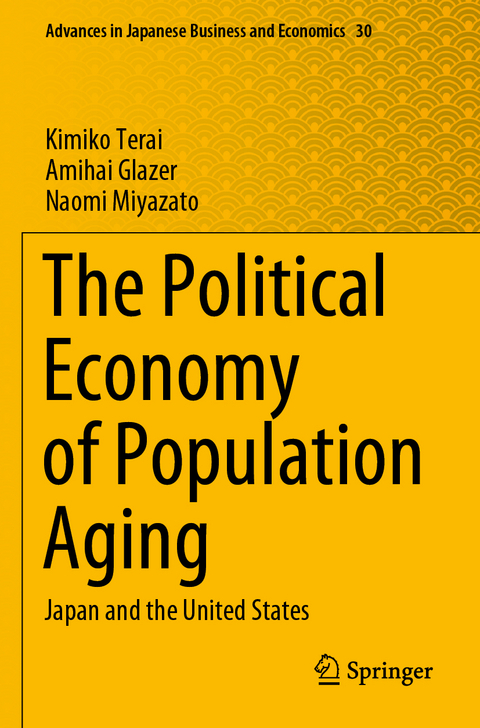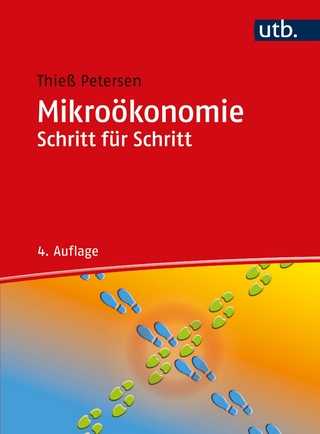
The Political Economy of Population Aging
Springer Verlag, Singapore
978-981-16-5538-8 (ISBN)
Kimiko Terai is a professor in the Faculty of Economics, Keio University, Tokyo, Japan. She finished her Ph. D. in economics at The University of Tokyo in 2003 and taught at Hosei University (2002–2012) before assuming her current position in 2012. She has held visiting researcher positions at the National Institute of Population and Social Security Research, Tokyo (1998–1999) and the University of California, Irvine (2007–2009). Her principal research areas include public economics, political economy, and public finance, with a special focus on the political economy of redistributive policies. She has published her work in academic journals that include Social Choice and Welfare, Journal of Public Economic Theory, Economics and Politics, Economics of Governance, and International Tax and Public Finance. She published The Political Economy of Fiscal Consolidation in Japan (co-edited with Toshihiro Ihori) in 2015. AmihaiGlazer is a research professor in the Department of Economics at the University of California, Irvine, California, U.S.A. He finished his Ph.D. in economics at Yale University in 1978 and began teaching at the University of California, Irvine, in 1979. He held visiting professor/researcher positions at Carnegie Mellon University (1991–1992) and Stanford University (1985). He is co-editor of Economics of Governance (from 1997), and is on the editorial board of Public Choice (from 1997). His principal research areas include political economy, public choice, and microeconomics. He has published many papers in academic journals including American Economic Review, Economic Journal, European Economic Review, Public Choice, Journal of Public Economics, Journal of Urban Economics, American Political Science Review, and American Journal of Political Science. He has also published and edited books, including Price Theory and Applications (1992), Why Government Succeeds and Why It Fails (2001), Conflict and Governance (2003), and Direct Democracy's Impact on American Political Institutions (2008). These volumes have been translated into Spanish, Japanese, Hungarian, French, and Chinese. Naomi Miyazato is a professor in the Department of Economics at Nihon University, Japan. His first academic position was as a researcher at the National Institute of Population and Social Security in Japan. He was a lecturer from 2005, an associate professor from 2008, and a professor from 2014 at Nihon University. He received a B.A. in economics from Ryukyu University, Japan, in 1995; an M.A. in economics from The University of Tokyo in 1997; and a Ph. D. in economics from The University of Tokyo in 2015. He was previously a visiting researcher at the University of California, Irvine, and the University of Pennsylvania, The Wharton School, and a research fellow, the Board ofAudit of Japan. His research fields are public finance, social security, and health economics. His research focuses on intergenerational distribution, public pension, and aging; he has studied these topics based on simulation and empirical analyses. His work has been published in Japan and the World Economy and the Japanese Economic Review.
Population Aging and Political Economy.- Expenditure on Public Investment.- Expenditure on Education.- Expenditure on welfare.- Interregional Tax Competition.- Comparison of Japan and the US.- Concluding Remarks.
| Erscheinungsdatum | 27.09.2022 |
|---|---|
| Reihe/Serie | Advances in Japanese Business and Economics ; 30 |
| Zusatzinfo | 16 Illustrations, color; 4 Illustrations, black and white; X, 104 p. 20 illus., 16 illus. in color. |
| Verlagsort | Singapore |
| Sprache | englisch |
| Maße | 155 x 235 mm |
| Themenwelt | Naturwissenschaften ► Biologie |
| Sozialwissenschaften ► Soziologie | |
| Wirtschaft ► Allgemeines / Lexika | |
| Wirtschaft ► Volkswirtschaftslehre ► Mikroökonomie | |
| Wirtschaft ► Volkswirtschaftslehre ► Wirtschaftspolitik | |
| ISBN-10 | 981-16-5538-3 / 9811655383 |
| ISBN-13 | 978-981-16-5538-8 / 9789811655388 |
| Zustand | Neuware |
| Informationen gemäß Produktsicherheitsverordnung (GPSR) | |
| Haben Sie eine Frage zum Produkt? |
aus dem Bereich


